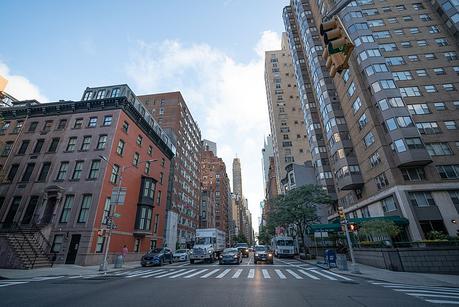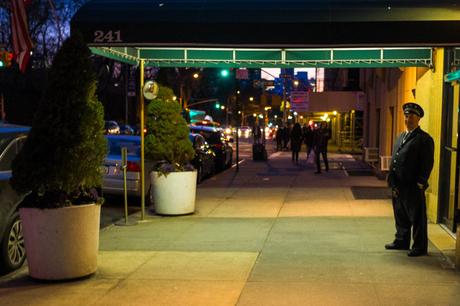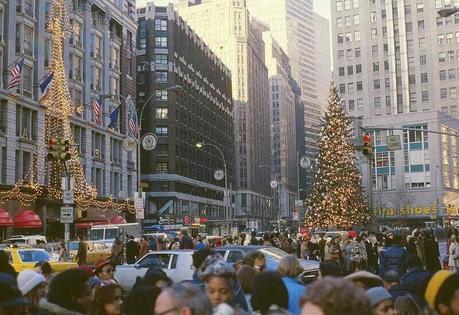
Manhattan. Forty-Second Street. The Big Manzana. The Big Red Apple. Sonny never thought it would be possible to live in Midtown, where every "young and upwardly mobile" New Yorker had dreamed of residing.
To be precise, the Delacruz family moved to 222 East 36 Street, right in the heart of the Murray Hill section of the city. Ritzy, high-rise apartments, where the filthy rich folks stayed, where the millionaires owned luxury condominiums and coops. It was near to everything that Sonny had loved: Madison Square Garden, Carnegie Hall, Times Square movie theaters, the Broadway theater district. Madison Avenue and the advertising industry. Lincoln Center for the Performing Arts, Central Park, the New York Public Library. Rockefeller Center, Grand Central Station, the Empire State Building, the Chrysler Building, the United Nations General Assembly Building... The Big Red Apple shone brightly before him.
Sonny's mind reeled at his good fortune; at being surrounded by such incredible sites, all those brick and mortar monuments to big-city life. They were what he had always wanted, what he had dreamed about, what he had thought about during his waking hours.
But Papi wasn't as impressed by their good fortune as Sonny had been. For the last sixteen years, Papi had worked as a lowly doorman in that same 222 East 36 Street complex, a combination business and residential area. The Delacruz family lived there rent free, in a newly refurbished "apartment" situated in the bowels of that same building.
Take the elevator to the ground floor (below ground, one should add). Head to the right and past the back of the boiler room; take a sharp left and walk down a dimly lit hallway to their apartment. To its right was a doorway that led directly, and to the right of, a largely empty holding area. This largely empty area was used, primarily, as a repository for old newspapers, magazines and metal trash cans. The janitorial staff would haul in the metal trash cans (clang, clang, clang) from the ten floors of the complex, down the service elevator and through the same winding passageway. The janitors pushed their handcars - with the clanging trash cans, of course - to the back of the holding area. Early in the morning (long before 6:00 AM Eastern Standard Time), the men would haul the trash out of the storage area and onto the sidewalk for the New York City Sanitation crews to pick up and empty out. Once the crews were done with them, the janitors would return the trash cans to their respective floors, a mindlessly drab daily routine that required brute strength and strong arms and backs.
In the early days, Papi had served as the building's night porter. This was before it became a union shop. Believe it or not, Papi was the guy charged with sweeping the staircases and mopping up the floors - nightly and on the weekends. Oh, man! The horrors he must have seen. Those monstrous rats at night, as big as small dogs; the swarms of cockroaches, hundreds upon hundreds of them, filing out of the sewers near the street openings. Even bats. Wow! Sonny took this last revelation with thick grains of monosodium glutamate, Papi's favorite flavor enhancer.
"Bats? You've seen bats, in New York City? No freaking way!"
Besides the wild animal kingdom, Papi had witnessed muggings and robberies on a fairly regular basis. For what it was worth, Papi had managed to prevent a number of such illicit attempts to deprive helpless citizens of their personal belongings. Because he was quick to react, with lightning fast reflexes and a fearless, confrontational, devil-may-care attitude, the people he assisted were always grateful for his interference.
"If it hadn't been for you, I would have lost a hundred dollars," one desperate lady had told him. She gave Papi twenty bucks for his efforts. Papi thanked her, but wanted to give the money back.
"Dis your money, lady. Joo can kip it." When she insisted and thrust the twenty dollar bill into his hands, Papi tried to return it.
"Keep it, you deserve it." And she rushed off down the street, leaving a startled Papi holding the bill in his hand.
Why did they move there, to Midtown Manhattan? What were they running away from? Better to ask how this all came about. It wasn't because Papi had hit the jackpot. Far from it. He bet heavily on the numbers, all right, as any self-respecting macho Latino would do, and he played the New York Lottery too. One time Papi won over three hundred dollars, a sign of impending good fortune. But to say he was financially "well off" was stretching the truth - probably about as far as the truth could be stretched, under the circumstances. He wasn't a George Jefferson-type character either, that comical, well-to-do black American who struck it rich with a string of successful laundry shops. No "Dee-luxe apartment in the sky" for the Delacruz family. None at all. Papi was a hardworking working stiff. Worked his damn butt off, he did. From sun-up to sundown. And that was no exaggeration.

He had lucked into his doorman job by walking into the building on a whim. Just like that. Can you imagine? He sure had guts. But there was more to it. Papi had heard, from friends who worked nearby, that a guy had been fired for drinking on the job. Papi drank, too, but never while on duty. He quit liquor altogether once he had his first heart attack. The first of several such attacks. But that was years from now.
One day, Papi decided to stop over at 222 East 36 Street and, for the heck of it, asked to speak to the superintendent. The doorman on duty went inside a little booth, rang a wall phone, and told the individual in charge to come up to the lobby. Papi waited patiently for the super who, when he finally stepped out of the service elevator, turned out to be a tall wire-thin black gentleman who looked about fifty or so. He greeted Papi warily and escorted him to the service elevator and down to the basement.
Stepping off the service elevator, the super, whose name was Harry Warren, showed Papi his office. The two of them sat and proceeded to chat for a bit, making small talk. Harry liked Papi from the start, thought he was a "straight-shooter." Lucky for him, Papi wasn't the type to pack a gun. But Papi did speak his mind.
"We need a night porter," Harry let on, "someone to keep an eye on the place while the rich folks are asleep. That means you got to come in 'round ten or eleven at night and stay till, oh, maybe five or six the next morning. That sound alright to you?"
"Is fine," Papi nodded. "I like."
The two shook hands and that was that. No more talk, no more interviews. Just action, swift and thorough. The starting salary was ninety-five dollars a week, with two weeks' paid vacation after the first year, working Tuesday to Saturday, with Sundays and Mondays off. Two regular holidays: Christmas and New Year's. The rest of the time it was work, work, and more work. That would be Papi's routine for the next sixteen-and-a-half years. After a full year as the night porter, Papi applied for and got the lead doorman's job. When he heard that the old doorman, Robert, had retired, Papi jumped at the chance of working the day shift. It would free him up from having to leave the apartment in the dead of night, and from coming home at the crack of dawn. He could sleep better, too. Like a normal human being. Yeah, normal. Whatever that meant.
Mr. Rosenfeld, the landlord, kept a spiffy penthouse apartment in the same building. He spoke to Papi personally about the job. Jacob Rosenfeld was an old Jewish landlord from way back. A born and bred New Yorker, Rosenfeld's family had emigrated from Russia during the early twentieth-century pogroms. At first, they lived in Brooklyn, near the Crown Heights section. Rosenfeld's father, a butcher by trade, had an older brother who was into the real estate business. The brother gave Rosenfeld a shot at making something of himself. Mr. Rosenfeld took the offer and wound up a very rich man, richer than Papi's family ever would be.
Rosenfeld used his money to purchase 222 East 36 Street, then set up a dummy corporation and raked in the rent from his tenants. His idea was that a combination residential and commercial building would suit his purposes nicely: rich old-timers like himself could live the good life in a spacious, multi-room abode, with maid and doorman service at their daily beck and call; if one or more of the tenants aspired to business interests, Jacob Rosenfeld would entice them to turn their spacious, multi-room apartments into commercial establishments. This paid off handsomely for Mr. Rosenfeld, who collected double the rent from every potential business endeavor he could swing on his own.
"What do say, Delacruz?" Rosenfeld asked Papi. "You interested in the job?"
"Yes, Mr. Rosenfeld," Papi replied. "I very interested. I do the day job, no problem."
"Good! Sign here, and we have a deal."
Papi was quick to sign the work contract. He liked Rosenfeld, thought he was a gentleman of his word. No putting on airs, no puffing out his chest, no beating around the bush; just a regular working stiff, if nicer dressed than your average Jewish landlord. After all, this was Manhattan. Crown Heights was one thing, but the heart of the Big Apple Midtown was something entirely different.
Jacob Rosenfeld showed Papi the ropes. To say the least, Rosenfeld knew a lot more about the property's inner workings than either superintendent Harry Warren or the veteran doormen, one of whom was an old fossil named Fred Whitaker. Papi made it his business to get to know the tenants by their names, both the renters and the business owners. In turn, the tenants took to Papi's easygoing, servile demeanor to heart. And he was unfailingly courteous to them, no matter how harshly he was treated - and some of the residents were extremely harsh. Some of them tried but failed to get under Papi's skin. Soon, they too fell under his cheery spell, if not exactly in love, with the way Papi maneuvered them into his good graces. Papi always reacted kindly toward them. He was deferential when he needed to be, servile when it was in his best interests, but firm when the situation called for it.
Little did any of them realize that Papi had been putting on an act. Of course, Papi was satisfied to be working at a permanent, full-time day job, with benefits, paid sick leave, vacation, and time off (all this took place AFTER Papi had engineered a maneuver to put the building's working stiffs under the auspices of Local 32B of the International Building Service Employees Union). Papi would brag aloud to his family and friends, and to Sonny especially, about how he got to know Mr. Arthur Hackham, the president of the union, when Hackham was but a lowly, streetwise ombudsman. It was Papi, he crowed, who helped Mr. Hackham place the building under a union contract. Mr. Rosenfeld, a wise-old conservative businessman at heart, wasn't bowled over by the deal, but understood that he needed to conform to the modern way of doing business in order to stay solvent.
Papi was pleased with the outcome. For him, it meant more time to spend with family, what with twice the vacation time allotted to each employee (now four weeks in all, instead of two). He also received a decent pay raise (to $125 a week, plus tips, and Christmas bonuses), and time-and-a half for overtime - double that on Sundays! The downside consisted of his having to work his old Tuesday to Saturday day shift. Papi still had to work those holidays, but at a higher hourly rate. Not bad for a simple New York City doorman. And those Christmas bonuses meant that Papi could afford to buy new and more elaborate gifts for Mami and the boys. That was what Sonny had in mind. But it remained an unrealized dream. "Could" became the key word.

Keeping track of all those bonuses was Harry's favorite task - that is, when he wasn't imbibing a snootful or two of Jack Daniels, especially around the holidays. Any holiday, to be precise. One time, Papi raked in almost a thousand dollars, a fortune that helped pay for his trips to Puerto Rico. "To visit the relatives," he would insist. That was his excuse. Papi's real motive, however, was to pick up where he had left off the year before: by going out to San Juan's dance halls and charanga his way onto the floor; with who knows what floozy-minded, big-butted bimbo brain, according to Mami.
But that was Papi. Always looking for a quick getaway (as if the family hadn't known). It was best not to dwell on this sensitive subject, Sonny had to remind himself. After all, Papi had always paid the bills and the rent. He didn't owe any money to anybody, well, none that we knew of. No gambling debts either, amazingly enough. No overdue electric bills and no telephone bills. Well, to be accurate, no telephone, period. Not until the family moved to Midtown. But the phone was free; it came with Papi's newfound position as the assistant superintendent. That was one of the main reasons for the move. Not only to flee the myriad horrors of public housing projects and the stifling, nonproductive atmosphere, but to start a new life in thriving midtown Manhattan. In that, Papi was insistent. Overly so! He was turning over a new leaf, as he liked to phrase it.
"I'm a man who keeps his word," Papi boasted proudly, mostly to himself. "I take care of my family, I do." And so he did. He also did not like to promise anything to anyone. But when Papi got around to making a promise, you could bet your life he would come through with it.
Except when he didn't.
Copyright © 2023 by Josmar F. Lopes
